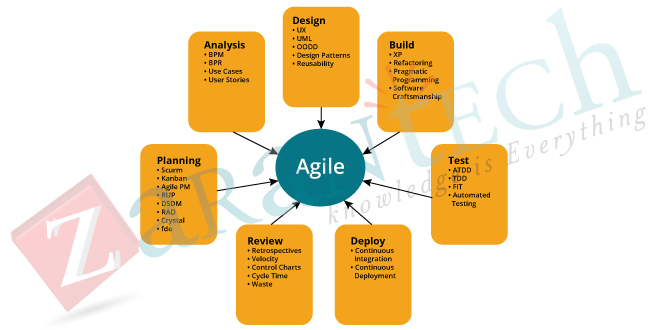The Evolving Role of a Business Analyst
Category: Agile Business Analysis Posted:Sep 07, 2018 By: Serena Josh
The role of a Business Analyst within the organization is changing continuously. Earlier they were a consultant to an organization, but now they are the permanent employees who are entrenched into the organizational structures and have an entrusted interest to make sure that the developed product is accurate, perform the intended work and achieves the business objectives. In any organization, the project plays a critical part. In a simple term, a project is defined as an activity or a series of task to develop a unique product. The organization follows various methodologies, to build a project. The waterfall approach was the traditional method which had been used in most of the companies, but currently, the organizations are moving towards the agile methodology. Due to the popularity of the digital age and the requirement of getting the market speedily the agile method is becoming the most popular framework for project development. With the introduction of this technique, the organizations are trying to line up themselves with the agile framework. There are different roles and responsibilities which has to be supported by various team members in the project. The business analyst is one of the participants who play an essential role and provides support to the agile techniques of working, with diverse goals and deliverable. This article is about the evolving role of a Business Analyst in the present varying project landscape.
Business Analyst’s Role
We know that business analysis is something which allows changes in an enterprise by specifying the requirements and mentioning the solutions that provide the value to the investors. Traditionally, the business analyst acts as a channel between the business, project and the IT teams. The business analyst acts as a connection or a bridge to understand, examine and translate between the business groups in the organization and the technology teams. The BA is the essential part which delivers these views and also brings in line the business goals with the venture in technology. The business analyst role can be relatively varied. At one point it is a connection between the leading organization’s framework, and at the other end, it is defined as an association between the requirements from the client and the software solution from the development team.The business analyst plays a vital role in moving the organization forward and making it much advanced. Well, the project development process involved different phases, i.e., requirement, analysis and design phase, the implementation phase, testing, and maintenance phase. The business analyst role is quite distinctive during all these phases, and they have the related responsibilities throughout all these stages. The business analyst is responsible for bringing in line the planned and delivered solutions according to the client’s requirements. The business analyst has to perform the following roles in an organization:
- Comprehend the issues and objectives of the organization.
- Analyze the requirements and solutions.
- Developing the strategies.
- Motivating the change and simplifying the stakeholder relationship
Thus, the role of the business analyst is more than just specifying about requirements; it is considerably broader and more attainment across the organization. Once the Business Analyst collects and specifies the requirements, the technical team understood them entirely and based on these requirements they design and develop the solution. If the business analyst knows his roles and responsibilities, it will help the organization to enhance and achieve its objectives continually. Therefore, we can say that the business analyst serves as a link between the business community and the technical solution providers during the life cycle of the project. Therefore, the business analyst plays a crucial role in the success of a project’s delivery. Now, let us explore the role of a business analyst in the agile environment.
Business Analyst’s role in an Agile Environment

It’s a challenging task for an organization to bring the requirements of the customers in getting the new products and improvements to the market rapidly and flawlessly. To fulfill this, the business analyst has to work in the continuously changing project environment. Now, most of the organizations are moving away from the traditional framework towards a more agile framework. Though the responsibilities of a business analyst in the agile environment, mostly remain the same, the focus is changing to a different set of tasks and deliverables that are exclusive to the agile way of working. The agile environment has an extensive effect on the existing organizations. To remain competitive in the market the organizations like financial service sectors are now utilizing the agile framework instead of using the waterfall approach as they want to stay up-to-date with the innovative technologies. So, it would be a challenging task for a business analyst to transition away from a familiar project delivery framework to the new one. These challenges involve an innovative way of working and also a new set of terminologies which is utilized to describe the agile path of project delivery.
The role of the business analyst is in much demand these days, concerning delivering the requirements, instead of just documenting them. The business analyst develops teamwork competencies that turn around the imagined communication and crisp pronunciation. The competent and proficient business analysis practices are essential all through the agile development because during each delivery cycle, it is required to validate and change the product to make sure that the product is varied and offering its expected value and in the anticipated direction.
In an agile environment, though the project delivery can be a product, service, or result, all the deliverables can be referred to as a product only. A product is developed as per the requirements, as specified in the document, text description, etc. But each of these options has benefits and risks associated with it. The business analysis helps to validate and speed up the validation process in an agile environment, whereas in the traditional approach of project development the validation is carried out at the end of the project, which may be a dawn procedure of validation and may fail to meet the business objectives. Because of this approach, the skills of the business analyst are evolving in the agile world. In agile environment, the business analyst concentrates on attaining the results which show business effect, instead of producing the outputs which define the requirements related to the business. The business analyst should learn the practices and apply them in the agile environment. Nevertheless, it is not just the utilization of these practices, but it is also the mindset and principles that required to hold the agile, this will ensure that a business analyst can be expert in an agile project.
The fundamental personal skills of a business analyst remain the same in an agile environment as of the traditional approach of project development. He should have excellent verbal and written communication skills, he should be a good problem solver, thinker, and analyzer and should be capable of involving with the stakeholders to know and answer to their requirements in the continuously changing business situations. The business analyst should act as a speaker that bridges the gap between the IT and business stakeholders.
Apart from the role in the agile environment, the business analyst role is changing in the different areas as well. Presently, the lead business analyst is managing the teams in a complex project, the other BA’s are working on the business architecture and other operating models at the organization level, and many large organizations involve business analysis practice. Therefore, the role of a business analyst is not only to gather the requirements but also they are helping in other areas of project development. Let us now explore the role of a business analyst changing in various ways:
- The rising complexity in projects: The business analyst has to deal with multiple complications in the project. The BA’s have adequate experience and toolkit to help the other experts to understand the actual requirements of the project as they are capable enough to work in more detail whenever required and also they have profound skills in analysis and modeling.
- The continuous enhancement in technology: The technology is continually developing in the area of data, cloud and mobile apps, and virtual working. Enterprises are producing more data nowadays. Many business analysts are capable of drawing perceptions of these data, and they utilize these data set in the requirement analysis. The business analyst who possesses these skills are in more demand now.
Go through our Top 4 Business Analyst Interview Question Patterns For 2020 to crack the Interviews
Conclusion
The role of a business analyst is evolving continuously, to deliver the solution to the business stakeholder. They have to perform different functions during the project development life cycle such as technical Business Analysts, Data specialists, Agile Business Analyst, Digital Business Analyst, etc. The business analyst should also learn the best practices and apply them in an agile environment for successful project delivery. Within the agile framework, the business analyst must include a different way of working, and they should work on various deliverables to provide the support for the delivery of small portions of the solution to the market. The highly skilled Business Analyst is one who can define the requirements clearly and briefly with the help of various tools and techniques which are in much demand nowadays.
I hope that by now you have had an overview of Business analysis. Before you enroll in ZaranTech’s certification course on Agile BA do check out this demo video:





 99999999 (Toll Free)
99999999 (Toll Free)  +91 9999999
+91 9999999